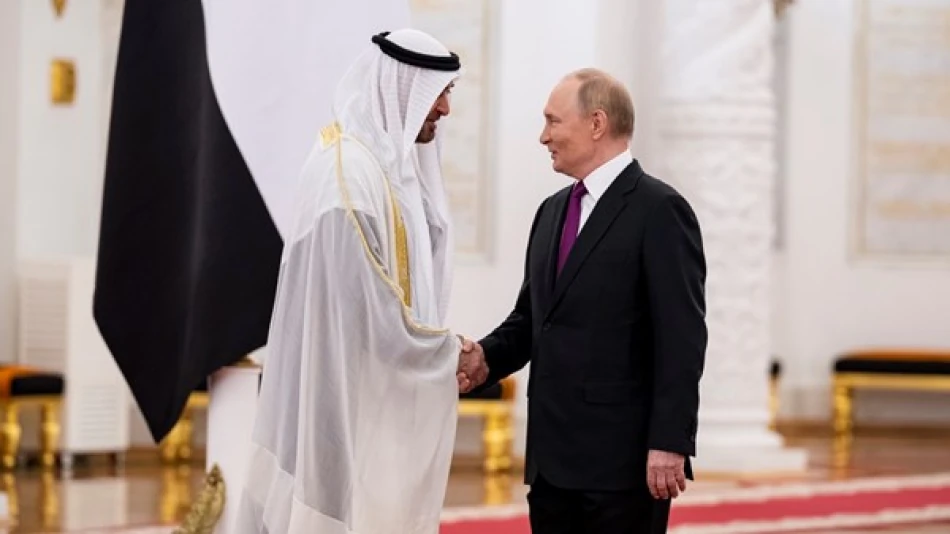
UAE President Discusses Strategic Partnership with Russian Leader Putin
UAE-Russia Strategic Partnership Deepens as Sheikh Mohammed Meets Putin in Moscow
UAE President Sheikh Mohammed bin Zayed Al Nahyan held high-level discussions with Russian President Vladimir Putin in Moscow, focusing on strengthening bilateral strategic partnerships and joint development initiatives. The meeting underscores the UAE's continued commitment to maintaining diplomatic and economic ties with Russia despite ongoing Western sanctions, positioning Abu Dhabi as a key bridge between East and West in an increasingly multipolar world.
Diplomatic Balancing Act Amid Global Tensions
Sheikh Mohammed's visit to Moscow represents a calculated diplomatic strategy that has become characteristic of UAE foreign policy under his leadership. While Western nations have imposed extensive sanctions on Russia following its invasion of Ukraine, the UAE has maintained a neutral stance, continuing to engage with both Russian and Western partners.
This approach reflects the UAE's broader strategy of economic diversification and diplomatic hedging, similar to how other Gulf states like Saudi Arabia have navigated complex geopolitical relationships. The Emirates has consistently positioned itself as a mediator rather than taking sides in global conflicts, a stance that has proven economically beneficial in previous regional crises.
Economic Implications and Trade Opportunities
Energy and Investment Flows
The UAE-Russia partnership holds significant implications for global energy markets and investment flows. Russia remains a major oil and gas producer, while the UAE serves as a crucial financial hub connecting Eastern and Western markets. This relationship could facilitate continued Russian energy exports through alternative channels, potentially affecting global commodity prices.
For investors, the deepening ties signal potential opportunities in sectors where both nations have comparative advantages, including energy technology, aerospace, and financial services. The UAE's role as a sanctions-compliant intermediary could prove valuable for international businesses seeking to maintain some level of engagement with Russian markets.
Financial Hub Strategy
The meeting also reinforces the UAE's ambitions to become a primary financial center for Russian capital seeking alternatives to traditional Western banking systems. Dubai and Abu Dhabi have already seen increased Russian investment and business registration since 2022, a trend that could accelerate following high-level diplomatic engagement.
Regional Stability and Global Positioning
Sheikh Mohammed's emphasis on "international cooperation to address global challenges and achieve peace, stability, and prosperity" reflects the UAE's broader foreign policy doctrine. This approach has historically enabled the Emirates to maintain relationships across ideological divides, from its Abraham Accords with Israel to its continued engagement with Iran.
The timing of this meeting is particularly significant as global powers reassess their alliances and trade relationships. The UAE's willingness to engage with Russia while maintaining strong Western ties positions it as an increasingly important player in global diplomacy, similar to how Singapore has leveraged its neutral status in Asia-Pacific relations.
Strategic Implications for Global Markets
This diplomatic engagement suggests that alternative economic and political alliances are solidifying, potentially reshaping global trade patterns for years to come. For multinational corporations and investors, the UAE-Russia partnership represents both opportunities and risks, as companies must navigate an increasingly complex web of international sanctions and diplomatic relationships.
The meeting also signals that efforts to isolate Russia economically may face continued challenges from nations prioritizing their own economic interests over Western-led sanctions regimes. This reality is likely to influence how international businesses and governments approach future geopolitical crises and economic statecraft.
Most Viewed News

 Layla Al Mansoori
Layla Al Mansoori






